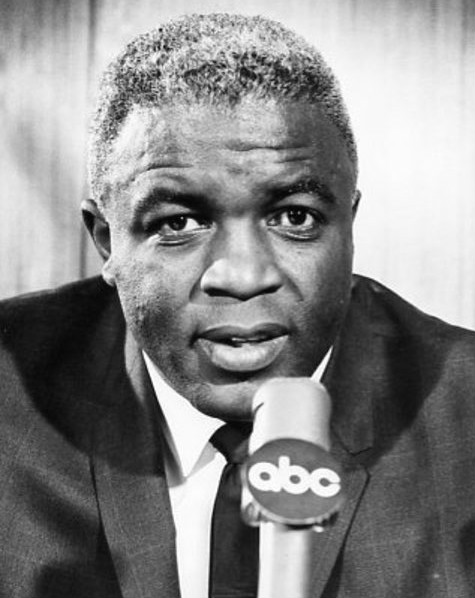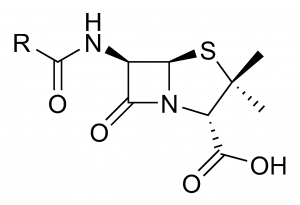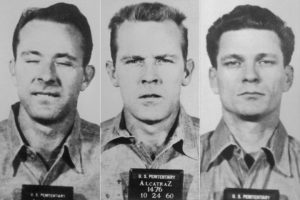After breaking down the race-wall in sports, Brooklyn Dodgers baseball player Jackie Robinson sought to create a more fulfilling role for himself in helping the African-American community. When he retired in 1957, Robinson took on a role as a businessman, and subsequently also as a player in the Civil Rights Movement of the 1950s and 1960s. Although he is better known for his athletic accomplishments, such as becoming the first African-American major league baseball player, winning Rookie of the Year in 1947, and leading the Brooklyn Dodgers to victory in the 1955 World Series, Robinson wanted to do even more than just be known for his baseball career.1 He felt like the best place to start was in the business world, where he hoped to promote the idea of “black capitalism.” The basic idea behind “black capitalism” was to increase the amount of African-American workers and business owners in Black communities, so that they might keep their wealth in their communities, thereby helping to build their communities’ wealth through reinvestment of that capital in their communities.2

Following Robinson’s retirement, William Black, the president of the coffee company Chock full o’Nuts, hired Robinson as one of three vice presidents of the company. Robinson brought a great deal of fame to the company name. As vice president, he was in charge of personnel, and he listened to the complaints of employees who worked at the company. But this was not his only job. Every three weeks, a column in Robinson’s name appeared in many of the newspapers in the suburbs of New York. He was able to accomplish this with the help of a young playwright named William Branch. Robinson’s articles primarily covered sports and topics of the day, such as the most recent of the lynchings in Mississippi, or even something simple like the actions of Steve Allen, a talk show host.3
One of his article’s caused one of the most controversial events to happen in Robinson’s life. A group of individuals from Glendale-Ridgewood, a section in Queens held a meeting to protest the overcrowding of nearby Brooklyn schools. It had been experiencing an increase in students, the majority of whom were African-Americans. This protest came about due to the insufficient schools in Glendale. Robinson responded to this incident in his column, calling the individuals from Glendale “bigots.” His response resulted in thirty people boycotting Chock full o’Nuts coffee and their restaurants. They argued that Robinson had written lies about them. Distressed by their response, Robinson felt responsible for causing the company to receive negative publicity and went to William Black for advice. Black then gave Robinson a statement to use for his next column. It read, “I cannot speak for all the stockholders of Chock full o’Nuts, because I now own only one-third of the company. Speaking for my third, if anyone wants to boycott Chock because I hired Jackie Robinson, I recommend Martinson’s coffee. It’s just as good. As for our restaurants, there are Nedick’s, Bickford’s, and Horn & Hardart in our price range. Try them. You may even like them better than ours.”4
Surprisingly, even though the company lost thirty customers, Chock full o-Nuts actually gained more customers because of this incident. A PTA president, from one of the overcrowded schools, sent a very heart warming letter to Black. The letter was filled with joy that Black decided to stand by Robinson’s side in this time of conflict. To show their gratitude, they explained how Brooklyn residents (a.k.a. “Brooklynites”) were going to clean the shelves of their coffee products and crowd every counter until the stores sold out of Chock full o-Nuts’ coffee.5

Robinson was also very active in the Civil Rights Movement of the early 1960s. In 1960, Martin Luther King Jr. was sent to jail in Albany, Georgia. That prompted Robinson to call presidential candidate Richard Nixon to intervene in the situation on behalf of King. However, Nixon refused to do or say anything. In 1962, determined to show his own support for the Civil Rights Movement, Robinson then marched with King in Birmingham, Alabama to protest against the harsh treatments of African-Americans in the state. Then, on June 12, 1963, the Mississippi NAACP leader Medgar Evers was gunned down by white supremacists. Three days after the shooting, Robinson sent a telegram to president John F. Kennedy asking for King’s protection while he attended the funeral for the fallen NAACP leader. The telegram raised an alarm, that if any harm were done to King, the consequences would cause mayhem, and conflict between the races would only rise. King was seen as a symbol of freedom. Robinson urged Kennedy to use everything at his disposal to ensure that King would be kept from harm.6
Despite his efforts at supporting the Civil Rights Movement, some activists did not agree with Robinson’s approach to civil rights. Robinson had a difficult time agreeing with the actions of the radical Black Muslim leader Malcolm X. Robinson’s support of the Civil Rights movement was questioned by Malcolm. Malcolm claimed that Robinson was a “house slave” who was bending the knee to his “White Bosses.”7 In a letter, Robinson informed Malcolm that violence against violence would only put more African-American youths in jail in their fight for freedom.8
Robinson did not stand for unreasonable violence, and tried to provide support for Self-Defense, a group within the Black Panther Party. Even after the assassination of Malcolm X, the group showed support for his practice, taking violent action when necessary. Robinson did his best to prove that the Black Panther Party was peaceful and fought for civil rights. But Robinson found himself in a bind, once the Brooklyn Criminal Court had a case dealing with ten Black Panther members, plus two white promoters, who had been charged with acts of violence against off-duty police officers and firefighters. In Robinson’s written statement, he expressed to the press how these Black Panther members were only trying to protect themselves against unnecessary violence. Their goals were no different than any other civil rights group, pushing for the protection of the African-American community. Robinson felt sympathetic for African-Americans that defended themselves against discriminatory violence, but could not agree with the “Black Power separatists.”9 In the late 60’s, the civil rights movement began to lose traction and branched off into a number of different directions. Even Robinson had grown distant from the movement. Robinson did not believe in the separation between races and could no longer agree with the direction the Black Panther Party was taking.10
During 1968, both King and Robert Kennedy were assassinated. Robinson became depressed. Deep down, he felt that their quest for equality had become even more difficult to achieve, now that such champions of equality had been silenced by assassins’ bullets. The Civil Rights Movement had a long way to go, and the accomplishment of King’s dream was incomplete. With the barriers Robinson struggled to break down while playing in the major leagues, it was not enough to change the rest of America. He had cut ties with the Republican party, due to the fact that he realized that the Republican party cared little for minorities. In 1969, Robinson refused to take part in an “old-timers game” held at Yankee Stadium. All Robinson wanted was to see more minority managers and executives in the sport, a dream that he believed the major leagues had fallen far short on.11
With no signs of positive change on the horizon, Robinson decided to take matters into his own hands, helping in a way he knew would make a difference. In the late 60’s, he created a construction company. He knew how poorly built Brooklyn housing was for the African-American community living there. They were slums falling apart, infested with roaches and rats. So, Robinson wanted to do something about it by renovating homes for African-Americans, creating affordable and comfortable dwellings. Robinson hired African-American workers to help further his belief in “black capitalism,” and this construction company was his vehicle for furthering that vision.12 And things seemed to be going well. Robinson was once again helping his community. However, everything changed in a single moment.
Robinson’s son, Jackie Jr. was arrested for the possession of heroin. He had developed an addiction due to his injury during the Vietnam war in 1968. Three years later, on July 17, 1971, while overcoming his addiction, Jackie Jr. died in a car crash. With the loss of his son and his own declining health, due to his fight with diabetes and hypertension, Robinson died of a heart attack a year later at the age of 53.13 Later, in 1997, the MLB retired the number of Robinson’s jersey, 42, forever. Throughout his baseball, business, and civil rights accomplishments, Jackie Robinson changed America in more ways than one. He fought the odds and became an inspiration to many African-Americans. To this day he is remembered as a hero and will continue to be one.14

- UXL Encyclopedia of U.S. History, 2009, s.v. “Robinson, Jackie,” by Sonia Benson, Daniel E. Brannen, Jr., and Rebecca Valentine. ↵
- Encyclopedia of African-American Culture and History, 2006, s.v. “Robinson, Jackie,” by Jules Tygiel. ↵
- Stanley Hyman, “The Other Jackie Robinson,” The New Leader 80, no. 7 (1997): 8-9. ↵
- Stanley Hyman, “The Other Jackie Robinson,” The New Leader 80, no. 7 (1997): 8-9. ↵
- Stanley Hyman, “The Other Jackie Robinson,” The New Leader 80, no. 7 (1997): 8-9. ↵
- Thomas W. Zeiler, Jackie Robinson and Race in America (New York: Bedford/St. Martin’s, 2013), 32. ↵
- Thomas W. Zeiler, Jackie Robinson and Race in America (New York: Bedford/St. Martin’s, 2013), 32. ↵
- Thomas W. Zeiler, Jackie Robinson and Race in America (New York: Bedford/St. Martin’s, 2013), 32. ↵
- Thomas W. Zeiler, Jackie Robinson and Race in America (New York: Bedford/St. Martin’s, 2013), 33. ↵
- Thomas W. Zeiler, Jackie Robinson and Race in America (New York: Bedford/St. Martin’s, 2013), 32-33. ↵
- Thomas W. Zeiler, Jackie Robinson and Race in America (New York: Bedford/St. Martin’s, 2013), 34. ↵
- Roger Kahn, “The Jackie Robinson I Remember,” The Journal of Blacks in Higher Education, no.14 (1996): 93. ↵
- Roger Kahn, “The Jackie Robinson I Remember,” The Journal of Blacks in Higher Education, no.14 (1996): 93. ↵
- St. James Encyclopedia of Popular Culture, 2013, s.v. “Robinson, Jackie (1919-1972),” by Victoria Price. ↵



52 comments
Emmanuel Ewuzie
“Shut up and dribble” was a phrase uttered by a Fox News reporter directed at professional basketball player, Lebron James, in response to him giving his opinions regarding world topics. Lebron James simply dismissed the asinine statement saying he was “more than an athlete”. Jackie Robinson chose to be more than athlete and got involved within his community attempting uplift those who were oppressed.
Kimberly Parker
Learning about Jackie Robinson and how he had so many athletic accomplishments, like becoming the first African-American major league baseball player, winning Rookie of the Year in 1947, and leading the Brooklyn Dodgers to victory in the 1955 World Series. I mean, he was the person who was able to blur the baseball color line and overcame many obstacles that were thrown his way. Although I was saddened to learn that when he believed everything was going well, his son ended up dying, which led to him having the heart attack that killed him.
Mark Dominguez
This was a very interesting and informative article. Before reading this, I had of course heard of Jackie Robinson and his accomplishments, but I had never known of his contributions during the Civil Rights time period. I had no idea that were was so involved in the movement, an example being how he created a construction company to help renovate homes for African Americans. He helped the community in so many ways.
Michael Lazcano
Jackie Robinson is a man that is not only revered for his athletic ability in the baseball world, but is also revered for his strength and conviction he showed in times of hardship. Growing up for him must’ve not been easy, and he fought for people of color to not have to experience what he had to. It’s sad the society back then wasn’t so readily accepting of these changes, but Jackie Robinson did as much as he could to raise awareness for equality.
Cassandra Sanchez
Jackie Robinson was more than just a baseball player, he used his large platform and influence on others to make a difference and fight for what he believed in. I have only ever known him as a baseball player but I enjoyed learning more about his character and his fight for equality. Robinson is a great person and throughout all of the pain he endured, his legacy will live on forever.
Raul Vallejo
I have always known about Jackie Robinson and the amazing and outstanding career that he had in baseball, and also the walls and barriers that he had managed to break down whilst becoming the very first African American to play in the Major League Baseball association. I never knew about his impact within a coffee company and hoe he used his fame to help the Civil Rights movement. Great Article!
Pablo Ruiz
I really enjoyed this article. I have always known about Robinson’s advocacy in the sports world for African Americans but never knew about his life after baseball. Its amazing how he used his voice to write and criticize things going on around him. I also never knew that Robinson marched with Dr. King which shows his bravery and advocacy for African Americans in all aspects of life.
Hector Membreno
This was an extremely well articulated article that explains nother side to the story of the life of Jackie Robinson that is not talked about so much. Before reading this article I knew a lot about the baseball carreer of Jackie Robinson and i knew a good bit about his efforts in the civil rights movement but I had no idea of how successful of business man Jackie was.
Charli Delmonico
This was an amazing story, and a side of the Jackie Robinson story that I haven’t ever heard before. I knew a lot about Jackie Robinson’s baseball career, but I didn’t know that he had become a successful business man or that he was so active in the civil rights movement. I’m in awe of everything Jackie Robinson was able to accomplish during his life; its so sad that he died at such a young age.
Thalia Romo
I thought this article was fantastic! I knew of Jackie Robinson and his baseball career, but not what lived on after it. I think it was interesting how he published articles in the news paper and one was able to get the attention of many individuals. I’m glad to hear that Robinson was a Civil Rights Activist speaking for what he believed. He’s a strong individual that has been able to impact the lives of many.